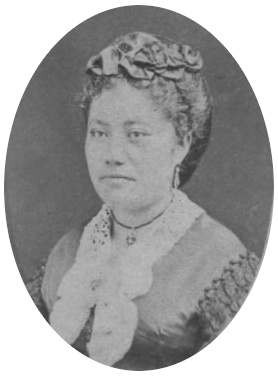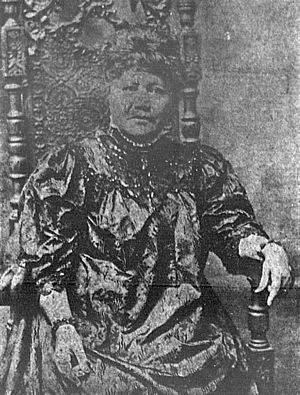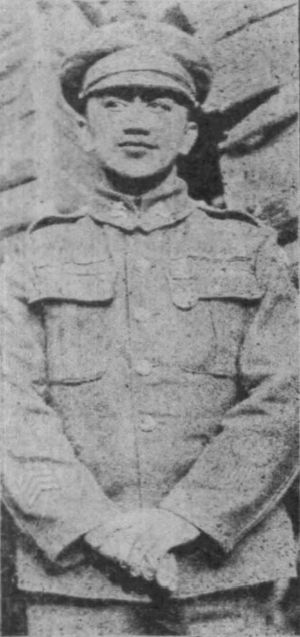Maria Beckley Kahea facts for kids
Quick facts for kids
Maria Beckley Kahea
|
|
|---|---|
 |
|
| Kahu of the Royal Mausoleum | |
| In office March 24, 1893 – July 11, 1909 |
|
| Preceded by | Poʻomaikelani |
| Succeeded by | David Kaipeʻelua Kahea and Frederick Malulani Beckley Kahea |
| Personal details | |
| Born |
Maria Angela Kahaʻawelani Beckley
December 23, 1847 Waimea, Hawaii |
| Died | July 11, 1909 (aged 61) Honolulu, Oʻahu |
| Resting place | Oahu Cemetery |
| Nationality | Hawaiian Kingdom |
| Spouse | David Kaipeʻelua Kahea |
| Children | 6 |
Maria Angela Kahaʻawelani Beckley Kahea (born December 23, 1847, died July 11, 1909) was an important Hawaiian chiefess during the time of the Hawaiian Kingdom. She was the granddaughter of Captain George Charles Beckley and High Chiefess Ahia. She also came from the family line of High Chief Hoʻolulu. He was famous for helping to hide the bones of Kamehameha I, a very important Hawaiian king.
When she was younger, Maria worked as a lady-in-waiting. This meant she helped and attended to Queen Emma and Queen Kapiʻolani. Later, in 1893, she was chosen to be the kahu (caretaker or keeper) of the Royal Mausoleum of Hawaii at Mauna ʻAla. This is a special burial place for Hawaiian royalty. She held this important job until she passed away.
Contents
Her Family and Roots
Maria was born on December 23, 1847. She was the only daughter and second child of Kahinu, a Hawaiian chiefess, and William Charles Malulani Kaleipaihala Beckley. Her family belonged to the aliʻi class, which means they were part of the Hawaiian nobility.
Her family's history was very impressive. They were related to King Kahekili II of Maui and King Līloa of Hawaii. Maria's father was one of the sons of Captain George Charles Beckley. He was a British sea captain and an advisor to King Kamehameha I. Captain Beckley married High Chiefess Ahia.
Maria's mother, Kahinu, was the daughter of High Chief Hoʻolulu. Hoʻolulu, along with his brother Hoapili, helped to hide the iwi (bones) of King Kamehameha I. They kept his burial place a secret after he died. Maria's Hawaiian name, Kahaʻawelani, means "carrying the heavenly one." This name honored her grandfather Hoʻolulu, who carried Kamehameha's bones to their secret resting place.
Life at Court and as a Caretaker
Maria served as a lady-in-waiting to Queen Dowager Emma. This was during the rule of King Kamehameha V (1863–1872). A lady-in-waiting is a female assistant to a queen or princess.
Later, when King Kalākaua became ruler in 1874, he wanted Maria to join his royal court. Queen Emma encouraged Maria to accept this offer. So, Maria became a lady-in-waiting to King Kalākaua's wife, Queen Kapiʻolani. King Kalākaua ruled until 1891. His sister, Queen Liliʻuokalani, then became queen and ruled from 1891 to 1893. Around 1891, Maria and Hawaiian musician Lizzie Alohikea wrote a song together called Ahi Wela.
On March 24, 1893, Maria was given a very important job. She and her husband were appointed kahu (caretaker) of the Royal Mausoleum of Hawaii. This happened two months after the Hawaiian Kingdom was overthrown and Queen Liliʻuokalani was removed from power. They took over from Princess Poʻomaikelani, who was Queen Kapiʻolani's sister.
Queen Liliʻuokalani wrote in her diary about this change. She said she was surprised but felt it was good that Maria would be the caretaker. Maria was the first person from the Hoʻolulu family line to be the kahu of the Royal Mausoleum. This special responsibility has continued in her family to this day.
In November 1894, Maria wrote a letter to a newspaper. She explained her strong connection to the royal family buried in the mausoleum. She also explained why access to the mausoleum was carefully controlled. She believed it was a sacred place for Hawaiian chiefs. She felt that only people with proper connections should be allowed inside. Maria wanted to protect the resting places of the chiefs from being treated as a public show. She welcomed flowers for decoration but insisted on respectful visits.
Passing and Burial
Maria Kahea passed away in Honolulu on July 11, 1909. She died from complications after surgery for stomach cancer. Her funeral was held the next day at the Cathedral Basilica of Our Lady of Peace. Many people attended, including relatives and members of old Hawaiian chiefly families. The Cathedral was completely full of people who wanted to pay their respects. She was buried at the Oahu Cemetery next to other members of the Beckley family. Her husband, David Kahea, took over her role as kahu of the Royal Mausoleum.
Marriage and Children
Maria married David Kaipeʻelua Kahea (1846–1921). He was from Maui and studied at Lahainaluna School. They had six children:
- Leander Kaonowailani (1875–1938)
- Violet Kahaleluhi Kinoole (1877–1958)
- Grace Namahana i Kaleleokalani (1878–1899)
- Frederick Malulani (1882–1949)
- George Healii (1886–1921)
- Benjamin Kameʻeiamoku (1892–1954)
Their son Frederick Malulani later became the kahu of the Royal Mausoleum, just like his parents. Another son, George Healii, served in the British Army and was recognized as a war hero by King George V. Benjamin Kameʻeiamoku fought in the Canadian Army.
Images for kids
 | Isaac Myers |
 | D. Hamilton Jackson |
 | A. Philip Randolph |




